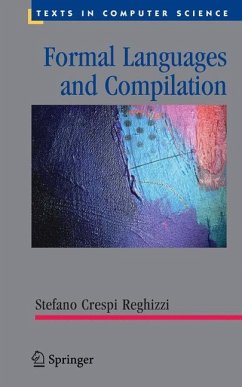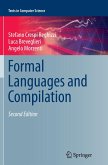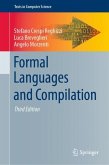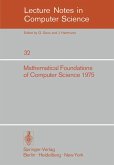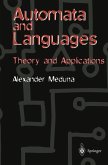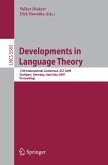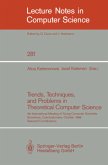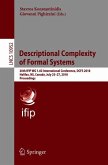This book covers the fundamentals concepts of formal languages and compilation.
The book presents the subject in a clear, reader-friendly and simple minimalist way, presenting the principles and methods used for defining the syntax of artificial languages and to implement simple translators, as well as in designing syntax-directed translators.
Features: Unifies the concepts and notations used in the various approaches of parsing algorithms; concepts are illustrated with many realistic examples, to ease the understanding of the theory and the transfer to application; theoretical models of automata, transducers and formal grammars are used extensively; algorithms are described in a pseudo-code to avoid the disturbing details of a programming language, yet they are straightforward to convert to executable procedures; problems and solutions are available via an author website.
This comprehensive and clearly written text will be welcomed by graduate students as the ideal guide to the fundamentals of this field.
State of books on compilers The book collects and condenses the experience of years of teaching compiler courses and doing research on formal language theory, on compiler and l- guage design, and to a lesser extent on natural language processing. In the turmoil of information technology developments, the subject of the book has kept the same fundamental principles over half a century, and its relevance for theory and practice is as important as in the early days. This state of a?airs of a topic, which is central to computer science and is based on consolidated principles, might lead us to believe that the acc- panying textbooks are by now consolidated, much as the classical books on mathematics. In fact this is rather not true: there exist ?ne books on the mathematical aspects of language and automata theory, but the best books on translators are sort of encyclopaedias of algorithms, design methods, and practical know-how used in compiler design. Indeed a compiler is a mic- cosm,featuring avarietyofaspectsrangingfromalgorithmicwisdomto CPU andmemoryexploitation.Asaconsequencethetextbookshavegrowninsize, and compete with respect to their coverage of the last developments on p- gramming languages, processor architectures and clever mappings from the former to the latter.
The book presents the subject in a clear, reader-friendly and simple minimalist way, presenting the principles and methods used for defining the syntax of artificial languages and to implement simple translators, as well as in designing syntax-directed translators.
Features: Unifies the concepts and notations used in the various approaches of parsing algorithms; concepts are illustrated with many realistic examples, to ease the understanding of the theory and the transfer to application; theoretical models of automata, transducers and formal grammars are used extensively; algorithms are described in a pseudo-code to avoid the disturbing details of a programming language, yet they are straightforward to convert to executable procedures; problems and solutions are available via an author website.
This comprehensive and clearly written text will be welcomed by graduate students as the ideal guide to the fundamentals of this field.
State of books on compilers The book collects and condenses the experience of years of teaching compiler courses and doing research on formal language theory, on compiler and l- guage design, and to a lesser extent on natural language processing. In the turmoil of information technology developments, the subject of the book has kept the same fundamental principles over half a century, and its relevance for theory and practice is as important as in the early days. This state of a?airs of a topic, which is central to computer science and is based on consolidated principles, might lead us to believe that the acc- panying textbooks are by now consolidated, much as the classical books on mathematics. In fact this is rather not true: there exist ?ne books on the mathematical aspects of language and automata theory, but the best books on translators are sort of encyclopaedias of algorithms, design methods, and practical know-how used in compiler design. Indeed a compiler is a mic- cosm,featuring avarietyofaspectsrangingfromalgorithmicwisdomto CPU andmemoryexploitation.Asaconsequencethetextbookshavegrowninsize, and compete with respect to their coverage of the last developments on p- gramming languages, processor architectures and clever mappings from the former to the latter.
From the reviews:
"One fundamental problem that every compiler should address: namely, translating one formal language to another. This book addresses this fundamental problem in breadth and depth. ... The book is intended as a textbook for graduate and advanced undergraduate students. It succeeds quite well in its goal of addressing the fundamental theory behind the syntax-directed aspect of compilers; hence, it is most suitable for students in a theoretical computer science (CS) program ... ." (MohammadReza Mousavi, ACM Computing Reviews, June, 2009)
"This textbook covers the fundamental concepts of formal languages and compilation. It presents a comprehensive selection of topics and is based on rigorous definitions and algorithms, illustrated by many motivating examples, with a focus on the importance of combining theoretical concepts with practical applications." (Jörg Desel, Zentralblatt MATH, Vol. 1190, 2010)
"One fundamental problem that every compiler should address: namely, translating one formal language to another. This book addresses this fundamental problem in breadth and depth. ... The book is intended as a textbook for graduate and advanced undergraduate students. It succeeds quite well in its goal of addressing the fundamental theory behind the syntax-directed aspect of compilers; hence, it is most suitable for students in a theoretical computer science (CS) program ... ." (MohammadReza Mousavi, ACM Computing Reviews, June, 2009)
"This textbook covers the fundamental concepts of formal languages and compilation. It presents a comprehensive selection of topics and is based on rigorous definitions and algorithms, illustrated by many motivating examples, with a focus on the importance of combining theoretical concepts with practical applications." (Jörg Desel, Zentralblatt MATH, Vol. 1190, 2010)

